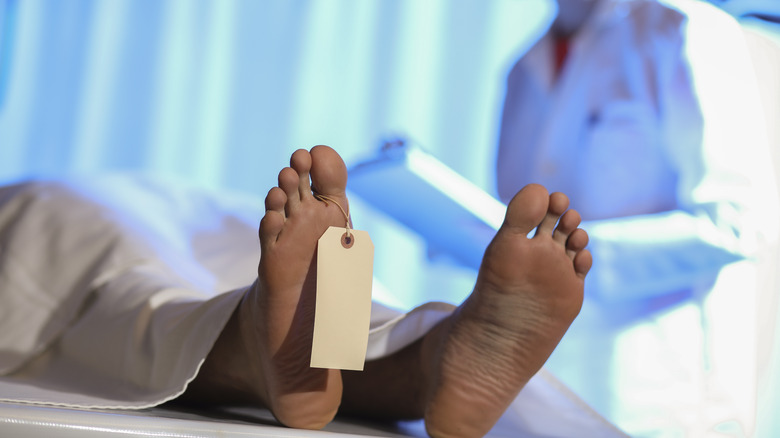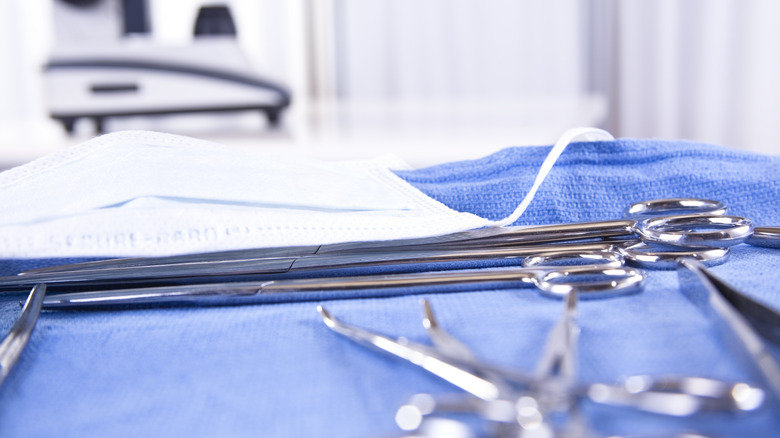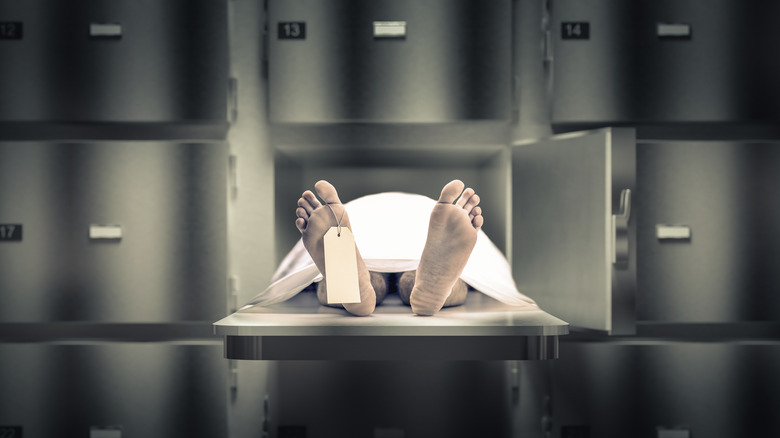How Much Does The Average Autopsy Cost And Who Pays For It?
Certain unglamorous realities always seem to get left out of crime shows, movies, and even books. For instance: Who cleans up crime scenes when police have finished combing through them? Does someone just roll in with a bucket and mop, bumping Taylor Swift on their headphones? How much time do investigators spend tapping away annoying notes on computers back at the station before yawning their way to a late dinner? And how about money? How do budgets get drafted, allocated, and resolved per city, district, station, and so forth? Someone's making loads of documents, liaising with agencies and individuals, requesting services, etc. Nothing is free. And when it comes to assessing and evaluating the dead, this is especially the case.
The reader can imagine that autopsies, of all things, require a deft hand as much as they do an expansive medical background. After all, as WebMD says, medical examiners get called to perform autopsies to determine causes of death, especially if someone dies in a suspicious way. Qualified medical professionals are often pathologists who specialize in disease assessment (per John Hopkins), or else forensic pathologists who specialize in connecting circumstances of death to crime scene specifics (per the University of New Mexico School of Medicine).
In other words: such expertise doesn't come cheap. The law firm Christie, Farrell, Lee, & Bell states that autopsies usually cost between $3,000 and $5,000. But no worries, because states cover the cost — unless families request the procedure, that is.
Universally expensive state-by-state procedures
If a person dies under suspicious circumstances, as Medical News Today says, a state orders an autopsy because a crime might have been committed. In other words, taxes pay for autopsies, but nitty-gritties vary from state to state. The San Diego Department of the Medical Examiner, for instance, says that the state of California's Medical Examiner Office absorbs the cost of an autopsy. The State of Florida Office of the District 21 Medical Examiner says that payment in Florida falls to "the county in the jurisdiction where the person died." The Utah Department of Health and Human Services says that the cost of an autopsy falls to them: the Utah Department of Health. Each state is different, as is each country around the world.
As far as cost is concerned, sites like PBS estimate $3,000 to $5,000, not including extra costs like transporting a body to and from the autopsy location. The Wall Street Journal, however, puts the low estimate at $1,000, while the Alzheimer's Association puts it at $2,000. The Quillen College of Medicine at East Tennessee State University gets more specific and includes different services that alter the cost. A $4,000 "standard autopsy," they say, includes internal and external examinations, written reports, etc., but doesn't include things like a toxicology analysis. A $5,000 "complicated autopsy," meanwhile, covers demand for additional expertise, like causes of death related to cancer or certain diseases. So overall? Autopsies aren't cheap.
Private autopsies
In some instances a state might not request an autopsy, but a family might want one anyway. PBS also points out that some people might request that an autopsy be performed on them after they die. In any case, if a citizen wants an autopsy done, a state won't cover the cost. There's no word on whether or not the cost of an autopsy changes if it's privately requested vs. absorbed internally by a governmental body, but it stands to reason that might be the case. PBS says that families work with outside medical experts like pathologists to conduct private autopsies at what Cremation Green calls "private forensics laboratories," as opposed to a county medical examiner.
Lastly, some readers might be wondering where the U.S. federal government is in this whole autopsy business. Simply put: The federal government doesn't foot autopsy bills. NPR wrote about this way back in 2010 in an overall discussion of how federal money ought to be allocated between various sectors, including military and legal. At the time, Charlie Wheelan, then of the University of Chicago, said that the Journal of the American Medical Association had been pushing for more autopsies nationwide for 15 years, but to no avail. More autopsies mean more health-related data to help the living, but as the CDC shows, the number of autopsies dropped sharply from 1972 to 2020 — from 19.1% to 7.4%. Whether these numbers relate to autopsy cost is unknown.


